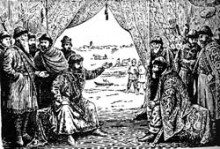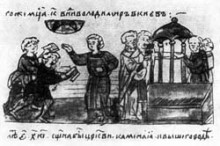In 1053, i.e., 951 years ago, Prince Volodymyr Vsevolodovych Monomakh (Monomachus) of Kyiv was born. He was a courageous and victorious warrior who wielded the sword during his entire lifetime, fighting the enemies of his native land. It is well known that he won victories over the Turkic peoples who dwelt near Pereyaslavl and mounted two expeditions to put down the restive Vyatychi tribe. He also pursued and drove away the Polovtsians, Rus’-Ukraine’s indefatigable and sinister enemies, capturing their chieftains and robbing them of their booty. Sitting on the throne of Chernihiv and later Kyiv, Volodymyr Monomakh did his best to keep breakaway principalities from internecine struggle, which only served to strengthen the external enemies.
Volodymyr Monomakh greatly contributed to establishing a fair court and system of law and order in his country; he introduced fines as judicial punishment for criminal offenses, set loan interest rates, and added new articles to the Rus’ Truth (a code of laws — Ed.). Historians rightly consider Volodymyr Monomakh one of the best princes of ancient Rus’, while a chronicler called him “one who tenderly loves brothers and beggars alike and worries about the land of Rus’.”
Proof of Volodymyr Monomakh’s enlightened mind and truly Christian soul is his Instructions to My Children that he wrote in 1117 for his sons Mstyslav, Yaropolk, Viacheslav, and Yury. This ancient document, which has fortunately survived as part of the Laurentian Chronicle, occupies a prominent place in the history of Kyivan Rus’-Ukraine.
At the beginning of the Instructions, Volodymyr Monomakh says that his grandfather, Kyivan Prince Yaroslav the Wise, gave him the Rus’ name Volodymyr and the Christian one Vasyl (Basil), while his father and mother called him Monomachus (“fighting in single combat”), for he was in fact the maternal grandson of Byzantine King Constantine Momomachus and showed military prowess in his youth.
“Hearken unto me — if not completely then at least by half,” Monomakh begins the instructive part of his testament. Explaining his lawmaking efforts, he says, “Do not let the strong ruin the weak and intervene on behalf of widows by yourselves. Do not kill either the innocent or the guilty one,” for the life and soul of a Christian are sacred. Volodymyr then notes that “fear of God and love for humanity is the foundation of virtue,” and so he advises not to forget but give food to the poor and remember that any property comes from God and has been entrusted to us only for a time. One should not hide wealth in the earth’s bowels, for this is alien to Christianity. The following lines in the Instructions are full of profound mercy and Christian morality: “Visit the sick, follow the dead, for we will all die. Do not have pride either in mind or in heart, but think: we are transient, we are living today but tomorrow we will lie in the coffin. Beware of lies, inebriation, and lust, for these are ruinous to both body and soul. Respect the old like your fathers and young ones like your brothers.” No less valuable is Volodymyr’s advice on economic matters: he recommends everyone to look after everything, without putting too much trust into youths and servants. Volodymyr also cautions those who travel around the country, “Do not let locals be hurt by princely youths; if you have put up at a place, give the host some food and water.” Then Volodymyr focuses on the special attitude to be shown to a guest, who must be highly respected no matter whether he is of high or humble origin, a merchant, or an envoy. “If you are not in a position to present the guest with a gift, you should wine and dine him because guests may spread both a good and a bad word about us in a foreign land.”
The following words from the Instructions are full of great humanism and a desire to learn the unknown, “Greet any man who is walking by. Love your wives, but do not let them domineer over you. You must remember all the good things that you have learned; if you do not know something, you must learn it.” Monomakh cites his father, Prince Vsevolod, as a role model who “could speak five languages without going abroad, for which foreigners highly esteem us.” “Laziness is the mother of all vices. Beware of it,” Monomakh warned.
Volodymyr Monomakh gives his sons equally valuable advice in the field of military service, noting that during war one must be active and set an example for commanders — it is not a time for boozing and lazing around. One must rest at night only after posting sentries. Since a soldier may meet unexpected death, he should not unhitch his arms where danger can lurk. One must rise early: “Let the sun not catch you in bed!”
Describing some details of his own life, Volodymyr Monomakh notes, “I used to do by myself all that I could have ordered the squire to do — during a hunt or a war, by day and by night, in the summer heat and winter cold I knew no peace. I did not trust the judiciary and other officials — I never allowed the strong to hurt the poor and widows, I would personally supervise church affairs and prayers, the household routine, stables, hunting, hawks and falcons.”
After enumerating his well-known historic expeditions and victories, Volodymyr writes in conclusion, “I have had a total of 83 expeditions, but I still cannot recall all the other, not so important, ones. I have made 19 peace treaties with the Polovtsians, taken prisoner and released from captivity more than a hundred of the finest princes, executed or drowned in rivers more than two hundred.”
Volodymyr is especially proud of his successes and adventures while hunting with his grandfather. He recounts a story of capturing two wild horses in a thick forest, of a buffalo goring him twice with its horns, a deer butting him, an elk trampling him, a bear biting through his horse’s saddle, and a savage beast pouncing on and bringing down his horse. “But the Lord protected me.” Volodymyr writes in his testament, “And you, children of mine, do not fear either death, or battle, or ferocious beasts. Instead, live up to any occasion that God may send to you.”
As a devout Christian who had a profound belief in God, Volodymyr warns, “Should providence decree that one must die, neither his father, nor his mother, nor his brothers will save him. Divine protection is more reliable than human.”
Having given so many meaningful and useful instructions, Volodymyr Monomakh also showed himself as a first-rate writer with a penchant for aphorisms, and a profound knowledge and respect for the Bible. Both in the Instructions and in real life Monomakh also displayed excellent diplomatic skills by using, among other things, the ties of kinship forged by his children. For example, after suppressing the Polovtsians by military force, Volodymyr tried to maintain neighborly relations with them by marrying off his son Andriy to Polovtsian Prince Tutorkhan’s granddaughter. To strengthen his ties with the Byzantine Empire, Monomakh gave his daughter in marriage to Leo Diogenes, a contender for the Byzantine throne. When Leo made a foray into Bulgaria, where he was killed in 1116, Monomakh, as his father-in-law, dispatched first his managers and later his troops. He thus intended to follow in the footsteps of his great-grandfather Prince Sviatoslav the Brave and to establish himself in Bulgaria. Yet, he failed to gain control over the Bulgarian lands and had to repair his relations with the Byzantine Empire in a diplomatic way. Following this, Volodymyr established close ties with Hungary and married off his daughter Yevfimiya to the elderly Hungarian King Koloman. But this marriage failed to result in family bliss, and the king sent Yevfimiya back to her father. Once in Ukraine, she gave birth to a son, Borys, who later became a contender for the Hungarian throne. A chronicle rightly calls Volodymyr Monomakh “good, loyal, Christ-loving, great, wonderful, holy, and kindhearted.” When he was alive, his sons never challenged his will, which allowed him to rule the great state with their help.
In a letter to the Grand Prince of Kyiv, Necephoros, the Metropolitan of Constantinople, gave quite an eloquent and convincing account of Volodymyr Monomakh’s intellectual, spiritual, and moral qualities, as well as of his good deeds as the ruler of a great state. He wrote in particular, “Reason is the secular eye of the soul that dwells in the head. As you, wise sovereign, sitting on the throne, rule the people by way of your deputies, so the soul rules the body by way of the five senses. I need not be more articulate than this, for your mind flies fast, catching the meaning of every word.” Then the metropolitan says, highlighting Monomakh’s attitude to work, war, and reception of guests, “...you, the son of princely and kingly (Greek) blood, the ruler of a powerful land, do not have a home, you always work and travel, and sleep on the bare ground. When you take off your favorite simple clothes and put on the majestic attire of a ruler, you treat others to sumptuous dinners but you yourself only look at the mouth-watering food.” Further on, speaking of Volodymyr’s generosity, the author of the letter notes, “What more can I do to extol your generosity, when you extend your right hand to all, when you hide neither silver nor gold, when, instead of counting money in your treasury, you hand it out all around? You will never become impoverished because divine grace is always with you.”
In conclusion, let us quote the words with which the Instructions begin, “Oh, children of mine! Praise God and love humanity!”
If not for this testament, we would hardly know the noble soul of Volodymyr Monomakh who, as the Russian historian N. M. Karamzin said wittily and laconically, “did not crush foreign states, but was the protection, glory, and consolation of his own country, and none of the ancient Rus’ princes has more right to be loved by posterity, for he served his fatherland and virtue with as great perseverance as possible.”








